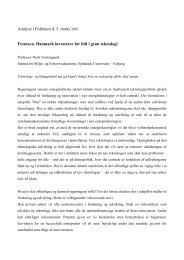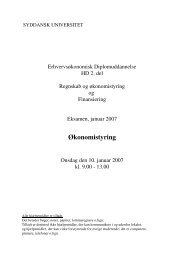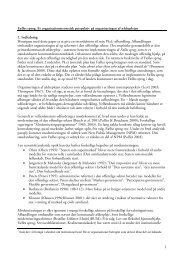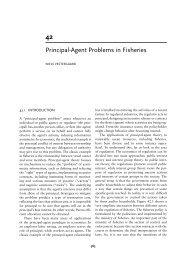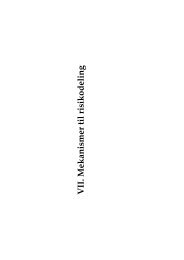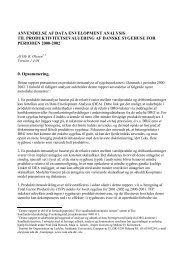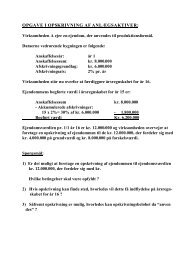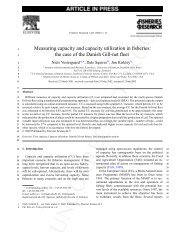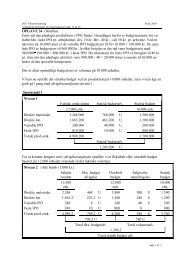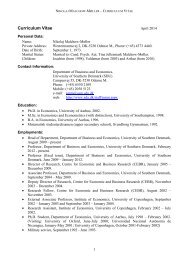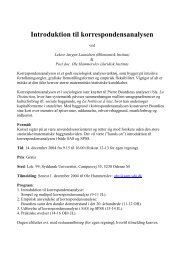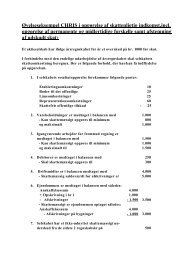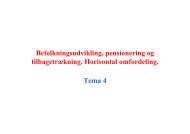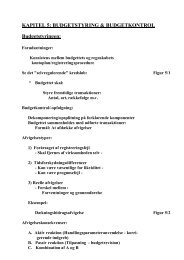Development of Parties and Party Systems in ... - lah@sam.sdu.dk
Development of Parties and Party Systems in ... - lah@sam.sdu.dk
Development of Parties and Party Systems in ... - lah@sam.sdu.dk
- No tags were found...
Create successful ePaper yourself
Turn your PDF publications into a flip-book with our unique Google optimized e-Paper software.
<strong>and</strong> workers voted ZChN. At the 1993-election, ZChN constituted the strongest party <strong>in</strong> the newparty-coalition (”Ojczyzna”), but that coalition did not have the sufficient strength to pass thetreshold requirements. At that election ZChN lost many votes from pensioners, self-employed <strong>and</strong>workers.Many voters distanced themselves from <strong>in</strong>terference <strong>of</strong> the Catholic Church <strong>in</strong> election campaigns<strong>and</strong> the dem<strong>and</strong>s for harsher decomunization (”dekomunizacja”) laws, the uncritical support to thechurch leadership <strong>and</strong> the resistance aga<strong>in</strong>st abortion frightened many voters. After the electiondefeat <strong>in</strong> 1993 ZChN aimed to rega<strong>in</strong> lost representation <strong>in</strong> parliament as quickly as possible. Thefact that ZChN jo<strong>in</strong>ed Election Action Solidarity (AWS) from the beg<strong>in</strong>n<strong>in</strong>g has to be seen <strong>in</strong> thatlight.After the 1997-election the ZChN acquired a rather strong representation <strong>in</strong> parliament <strong>and</strong> for thatreason a key position <strong>in</strong>side the AWS faction <strong>in</strong> parliament (Knuzewski 1998:153). In JerzyBuzek’s government ZChN had to contend itself with two m<strong>in</strong>isterial posts <strong>and</strong> no posts at all atvoivod level, but as a compensation important adm<strong>in</strong>istrative posts. In Buzek’s government ZChNconstituted the anti-pole <strong>of</strong> the Freedom Union (UW) 59 . The Freedom Union (UW) rejected almostall ZChNs policy dem<strong>and</strong>s, e.g. about stricter religious celebration <strong>of</strong> Sundays, extension <strong>of</strong>maternity leave, changes <strong>in</strong> the tax system benefit<strong>in</strong>g the families, tighten<strong>in</strong>g <strong>of</strong> sentences for sale<strong>of</strong> narcotic, limits on the number <strong>of</strong> new supermarkets <strong>and</strong> a tougher l<strong>in</strong>e <strong>in</strong> negotiations with theEU.Several personal divisions came up. Thus Jerzy Kropiwnicki from ZChN, the leader <strong>of</strong> the Centrefor Strategic Studies, had several clashes <strong>and</strong> conflicts with f<strong>in</strong>ance m<strong>in</strong>ister Leszek Balcerowiczconcern<strong>in</strong>g the economic policy. The Freedom Union (UW) was also beh<strong>in</strong>d the dismissal <strong>of</strong> theeurosceptical Ryszard Czarnecki from ZChN. In some cases division between UW <strong>and</strong> ZChN evenparalysed the government. Compromises were only entered after lengthy negotiations. That thegovernment did not resign was primarily due to fear <strong>of</strong> a new election. In case <strong>of</strong> a new electionZChN <strong>in</strong> all probability would loose its representation <strong>in</strong> parliament like at the previous 1993-election.ZChN did, however, not obta<strong>in</strong> a monopoly <strong>of</strong> Christian political representation. In the late 1999rumours about a merger <strong>of</strong> the Centre alliance (PC) <strong>and</strong> the Christian Democratic <strong>Party</strong> (PCD) werecirculat<strong>in</strong>g. After the <strong>in</strong>clusion <strong>of</strong> the Christian association PPChD <strong>in</strong> the AWS a new Christian”leg” emerged. Also former president Lech Walesa formed his own new Christian party, TheRepublic <strong>of</strong> Pol<strong>and</strong>’s Christian <strong>Party</strong> (ChD III RP), however, without ga<strong>in</strong><strong>in</strong>g the sufficientelectoral support.In spite <strong>of</strong> the disagreements with Freedom Union (UW) ZChN followed a pragmatic <strong>and</strong>compromise-seek<strong>in</strong>g policy-l<strong>in</strong>e. For fundamentalist political groups like ”Poruzumienie Polski”(PP) politics was a question about “life <strong>and</strong> dead” <strong>and</strong> “truth <strong>and</strong> lie”. Accord<strong>in</strong>g to ZChN politics isprimarily a question about ”give <strong>and</strong> take”, i.e. about negotiations, barga<strong>in</strong><strong>in</strong>g <strong>and</strong> compromises.Opposite, PP followed a harder l<strong>in</strong>e <strong>in</strong> particular when deal<strong>in</strong>g with questions related to the periodbefore 1989, i.e. the III Republic. Accord<strong>in</strong>g to PP ”traitors” were not only the ”post-communists”,but all neoliberal <strong>and</strong> secular currents <strong>and</strong> not least the liberal F<strong>in</strong>ance M<strong>in</strong>ister LeszekBalcerowicz.59 The conflict between ZChN <strong>and</strong> UW is analysed <strong>in</strong> e.g. Filip Gawrys, Mart<strong>in</strong> Dom<strong>in</strong>ik Zdort, ”Straznicy isprzedawcy swietego ognia”, Rzeczpospolita 4.2., 2000:A4.68



